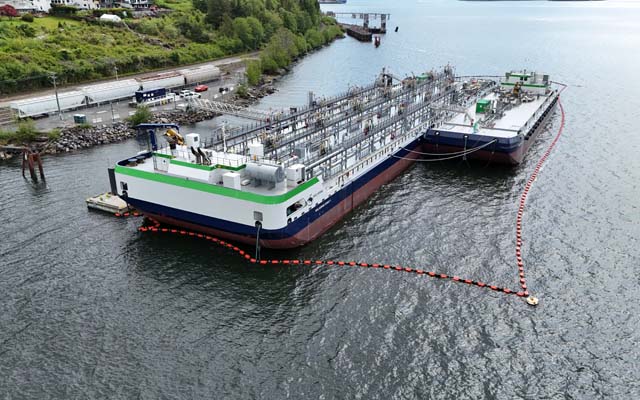The port of Prince Rupert has recently welcomed the startup of Wolverine Terminals’ marine bunkering service for deep sea shipping, thus adding a key logistical capability to this strategic deepwater port on the west coast of Canada.
Using a pair of barges designed by Robert Allan Ltd (RAL), Wolverine Terminals can deliver a range of fuels to suit the needs of vessels calling at the port, including MDO, HFO, intermediate, and other blends to individual customer specifications. By introducing this service, deep-sea ships may now bunker at this growing gateway to North America, which features favourably short trading routes to Asia and access to a supply of domestically produced fuels.
The Wolverine Terminals fleet is composed of a transloading barge and a fuel delivery (lightering) barge.
Wolverine Spirit 1, the 142m long transloading barge, has been custom-designed to accept up to 24 rail tank-cars on deck. These are loaded using a marine rail ramp in Prince Rupert with maximum efficiency using four rail lanes with a pair of onboard turnouts (switches) – a novel arrangement on a rail barge. Combined with a high-performance ballasting system and Wolverine’s dedicated locomotive, this barge can onboard a full set of railcars during a single tide. Once loaded and secured, the transloading barge is moved using tugs from the loading ramp to the Wolverine Terminals project site, where once moored, the railcars can be drained into the barge’s hull tanks, which have a combined capacity of nearly 80,000 barrels of oil products.
Wolverine Spirit 2, the 78m long lightering barge, receives fuels from the transloading barge, and is towed to client vessels in harbour where it delivers fuel to their individual requirements. With a capacity of about 30,000 barrels of products, this barge can efficiently deliver fuels to ocean-going vessels at up to 450m3/hr.
Both barges have been designed to maximise safety of operations. In addition to featuring double-hulls, there are extensive containment and response systems aboard both barges, as well as fire-fighting systems and equipment. Access to the railcar tops is via a fixed gantry system with safe harbour access platforms/gangways, while access between the barges is via a swinging Verhoef gangway with articulated stairs that adjust to ensure safe passage for all combinations of draughts and freeboards between the two barges. Cranes on both barges facilitate the transfer of equipment from shore and handling of hoses.
Both barges are fully compliant with Transport Canada regulations and are classed for their service with Lloyds Register. Attention has been paid to keep all potential sources of emissions low, with IMO Tier III compliant exhausts equipped with after-treatment, silencing for all diesel-fired machinery, vapour recovery for the cargo systems, and low-intensity lighting.
Specifically tailored to meet Wolverine Terminals’ needs, these barges are designed to deliver best-in-class bunkering and logistics whilst minimising environmental impact and contributing to the economic growth of the port and region. They are seen as examples of RAL’s ability to design customised vessels of virtually any type and complexity to customers’ unique project requirements.
Image: A pair of RAL-designed bunkering barges for Prince Rupert, Canada (credit: Robert Allan Ltd)



